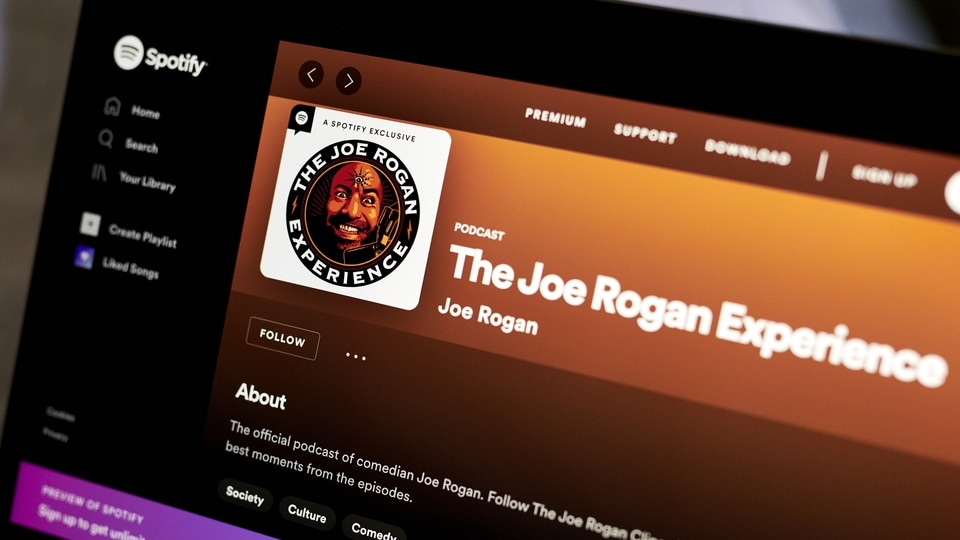Facebook moment for Spotify? Joe Rogan is not the only problem after Neil Young firestorm
A controversy is raging that started when Neil Young demanded his music be removed from Spotify over concerns that Joe Rogan is spreading vaccine misinformation.

Spotify Chief Executive Office Daniel Ek is trying to extinguish a raging controversy that began a week ago, when singer Neil Young demanded his music be removed from the platform over concerns that its most popular podcaster, Joe Rogan, is spreading vaccine misinformation. The company, which has a $100 million deal with Rogan, dropped Young, prompting a social-media firestorm.
Over the weekend, Ek said Spotify would add an advisory to podcasts that discuss Covid-19 and direct listeners to a hub offering more information about the pandemic. The company also published rules on what content is and isn't allowed on its service. But even if that puts out this particular fire, Spotify's ambitious expansion into podcasts all but guarantees there will be more conflagrations, of varying degrees of intensity, in its future.
In a Twitter Spaces discussion, Bobby Ghosh asked fellow Bloomberg Opinion columnists Parmy Olson and Lionel Laurent to weigh in on Ek's predicament and what lies ahead for his streaming service. This is a lightly edited transcript of their conversation.
Ghosh: Lionel, you've described this as Spotify's “Facebook moment.” Could you expand on that?
Laurent: Spotify wasn't supposed to be part of the conversation about misinformation. It was the savior of music industry; it turned music streaming into a legal format with a $9.99 subscription. It was never the subject of this kind of discussion.
What changed? Spotify wanted to grow, and it couldn't grow with music alone. It needed to get into podcasting. It showered money on all types of podcast stars, to please everyone, to be all things to all people. It started to become a media firm.
And as it got into this world, it couldn't avoid getting sucked into what we've seen happen to Facebook or Twitter, where suddenly it's responsible for content. It's even more fraught for Spotify because it's paying for the podcasts.
For Spotify, this is a major moment. Ek seems to be taking this seriously. He's trying to show that the company's willing to do more. He's using Facebook language: “We're listening. We're sorry. We're going to analyze the content a bit more.”
Ghosh: Parmy, what are the lessons of Facebook that Spotify should be cognizant of in this moment? You did this very interesting interview with Renee DiResta, the technical director of Stanford Internet Observatory, who's researched misinformation on internet platforms. Where does Spotify fall in the spectrum?
Olson: Well, one difference is that Facebook is free and anyone can post on it. That's why people like to call Facebook a public square. And that also makes it much easier for people to accuse Facebook of censorship when it tries to remove posts from anti-vax campaigners or people who think that Donald Trump won the election in 2020.
But Spotify looks more like a traditional publisher. It paid $100 million for an exclusive contract with Joe Rogan. Facebook didn't pay anything to Donald Trump to host him on its site. And nobody paid Facebook to read Trump's posts.
Spotify can take off the controversial episodes of the Joe Rogan podcast. It certainly has the right to do so as a business. The problem is the financial impact of losing Rogan. Spotify shares have fallen quite a lot in the past year. I think it would be very difficult.
One important similarity with Facebook is in the area of recommendation engines. People get posts recommended to them by Facebook's algorithm, and because conspiracy theories are titillating and engaging, people love clicking on them. I don't use Spotify, but I've heard people who do use the app say that although they never listen to Joe Rogan, they see his podcast recommended to them all the time.
That's an area where Spotify has some options. Maybe it doesn't have to take Joe Rogan's episodes down, but it could certainly do something about the algorithms. It can reduce the number of times that it's recommending Joe Rogan's podcast to people.
Ek says he doesn't want Spotify to be a “content censor,” which is an odd phrase. It would be much more logical — and neutral — to say “editor.” But this illustrates that Spotify doesn't want to be seen as a traditional media publisher or broadcaster. It wants to be seen as a tech company. And when it's seen in that way, it's so much easier to keep these issues at an arm's length and avoid accountability in ways that a media company cannot.
But his idea of putting a kind of warning or disclaimer on some podcasts feels like a half measure. I don't think it's going to do anything. If you like Joe Rogan and you see that label on one of his episodes, you're going to listen to it anyway. I don't think these things stop people from listening to this kind of stuff. You have to take it down or you have to lower its ranking in the recommendation engine. That's pretty much the only way they can deal with this.
This controversy, in a way, is going to make people start paying more attention to what is being said in podcasts. I would almost expect there to be a little chilling effect on what people say in podcasts, what podcast hosts say — particularly as we get closer to the next U.S. election and Donald Trump is back on the scene.
Ghosh: It's worth mentioning that Joe Rogan has felt obliged to apologize. He has promised to be more balanced, to research his podcasts better.
But I felt like a can of worms was being opened last week. If we go down this road with podcasts, there are also questions to be asked about music, about lyrics. There is a very old debate about what gives offense, what constitutes propriety in music. Plenty of songs on Spotify are misogynistic, homophobic. Where do you start the discussion? Where do you end it?
Laurent: It is amusing that you can play the Sex Pistols on Spotify and hear them call for the downfall of the British monarchy. And then when your kid puts on Joe Rogan, you say, “Come on, turn that polarizing podcast down.”
But we live in a world where music has clearly lost the capacity to shock. It's lost the capacity to create revolution, the zeal Neil Young felt in his Woodstock days. And this is why Spotify is expanding into podcasts: because music is commoditized. There's a new frontier with podcasts.
Ghosh: We've been talking about streaming companies versus artists, streaming companies versus podcasters. It's worth spending a few minutes talking about the role of the potential referees. British and European regulators have been paying close attention to streaming platforms. How will governments respond to this kind of controversy?
Olson: It's probably the last thing regulators want to have to do. Just think about how you moderate this. Facebook can do this at scale: It can look out for hate speech and for misinformation with machine learning, algorithms that look for keywords, and so on. How do you do that with audio? Just computationally, that's so much more challenging and so much more expensive.
For regulators, for this to be part of their remit would be a nightmare. It's not just Spotify that's hosting controversial podcasters. Apple Music has a lot of controversial podcasts on it. Spotify isn't alone.
Laurent: This idea of a regulator needing to step in every time and say, “This is good, this is bad” — that doesn't work. However, Spotify could make the case that the best way to deal with this isn't taking down stuff, being a censor; it's adding more stuff. If the problem is bad content, it can put up more good content. For example, it could use its Greenroom app for discussions, debriefing Rogan's podcasts.
I'd prefer to see regulators focus on enabling competition in streaming. Right now, in the middle of this controversy, some of the people who want to leave Spotify feel trapped because they've built their whole lives on the app, and the cost of switching is high. They should be able to say, “I'll go to any other platform, export my playlist, and listen to Neil Young there.” That would be more useful than saying, “Where's the regulator? Someone needs to take this down.”
Olson: I think there's also an opportunity here for companies to self-regulate. Remember, Netflix had a similar issue a few months ago with the Dave Chappelle controversy. One way Facebook has dealt with this is to set up an oversight board, made up of 20 people from all walks of life. They look at Facebook's content decisions and adjudicate on whether the company made the right calls.
It's not perfect, and arguably the board isn't really independent from Facebook. But it's useful in this transition period, where we don't have regulators able to act quickly on this kind of thing.
So that's one potential solution, for Spotify to set up some kind of supervisory advisory board of people who can have some sway over controversial decisions like this.
Ghosh: Lionel, you make the point in another column about the lack of choice in music streaming. Spotify has 380 million listeners, nearly a third of the market, and its nearest competitor, Apple Music, is far behind. Are there any others coming up that might challenge the dominance of Spotify?
Laurent: I think Jack Dorsey's venture into this world is interesting. He bought Tidal last year. I hope some good comes of that.
Ghosh: But if Spotify feels like it needs podcasts in order to make the business model work, can Jack Dorsey make money just from music?
Laurent: It depends what the actual business model is. But the idea that the only model that we could possibly imagine is just one platform, with every type of audio on it, doesn't strike me as exciting.
Olson: The music streaming business is very complex. You've got copyright issues, you've got royalties, you've got the artist relationships, so many different stakeholders, and the margins are pretty low. And then you compare that with podcasting, which has higher margins and seems much simpler.
But what we're realizing now is that podcasts really aren't that simple. There are all these issues around content. Who knows how much time and investment Spotify is going to have to put into moderation? And not just Spotify — maybe this is something other similar platforms will have to do.
Catch all the Latest Tech News, Mobile News, Laptop News, Gaming news, Wearables News , How To News, also keep up with us on Whatsapp channel,Twitter, Facebook, Google News, and Instagram. For our latest videos, subscribe to our YouTube channel.

























